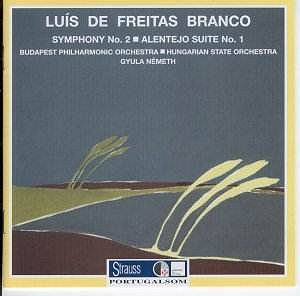After venturing out on the uncharted waters of
Frederico de Freitas and Joly
Braga Santos, it was high time I got to grips with the music of Luis
de Freitas Branco. As usual the inexpensive roster of Portugalsom-Strauss
yields up a fantastic selection of music even if you sometimes have to
accept AAD recording.
For a Symphony written in 1924 this one sounds
rather old-fashioned (mind you the 1920s was not a decade for symphonies,
anyway) - no harm in that. Its Lisztian macabre and Sibelian melodic
flow are no obstacle to the easy-spinning beauty of a tune liberated
and running free in the first movement. This has a darting spirit that
recalls Bizet and Chabrier. The consolatory Andante is lovingly
done - sung by refined vulnerable strings echoed back and fore with
the woodwind. The Allegro vivace has a Franckian stamp with lightning
slippery dash and only a micron or two of the shine taken off by the
lack of perfect unanimity in the Hungarian strings. Final movements
are always difficult to pull off; this one has melodrama but sounds
rather contrived.
Quental, the Portuguese author, is celebrated
in the boiling Lisztian tone poem in which the string sound touches
on Bruckner's intensity (quite a strong voice in this work - listen
also to the brass parts). There is also a touch of the complexity of
Verklärte Nacht. It would be good to hear the similarly
literary-inspired orchestral pieces of Freitas Branco on readings of
Julio Diniz and Guerra Junqueiro.
Decent notes from Joao de Freitas Branco. Much better
translated and proof-read than some in this series.
Rob Barnett
|
|
Luis de DE FREITAS BRANCO
(1890-1955)
Symphony No. 2 (1926) [43.27] *
Alentejo Suite No. 1 (1919) [24.53]
Budapest PO/Gyula Nemeth *
Hungarian State SO/Gyula Nemeth
Rec Hungaroton Studios, Budapest, 15-19 Feb 1983 *; 18-25 April 1979
ADD PORTUGALSOM STRAUSS CD SP 4073 [68.55] |
The politics behind this Portugalsom series may well have been intriguing.
Hungary and Budapest seem unlikely bedfellows for the Iberians. I am
not sure if I will ever fathom the reason for such a collaboration although,
when I see that Bomtempo's Requiem in the EDEL, Berlin Classics catalogue,
I suspect that communist sympathies had more than a little to do with
it. It's just a pity that these sympathies did not export to the UK and
leave us with a complete set of Eastern German Alan Bush operas and
symphonies!
What of Freitas Branco on this disc? This is the most generously timed
of a usually parsimonious series. The Symphony is no brevity
either. It plays for close on three quarters of an hour. Its Brahmsian
sympathies are not left to guesswork. Its heavy charm can give way to
Poulencian levity. The first movement's mournful anthem to bereavement
has a touch or two of Finlandia about it as does the passionate
processional that follows it. The witchery of the Allegro vivace
is given a virtuoso spin by the Budapest orchestra. The last movement's
jollity soon finds an impassioned touch and the payoff brings the house
down.
The Alentejo suite rings the changes through high glistening
strings, a falteringly innocent song and airy textures. This is far
more impressionistic than the Second Symphony. If you have a taste for
unfamiliar Iberian colour then look no further. Updated shades of both
Sarasate and Chabrier!
The notes are so-so being far too taken up with arid musical analysis.
The music is well worth hearing - a meaty symphony influenced by Brahms,
Dukas, Chausson and an eventful douche of impressionistic colour.
Rob Barnett
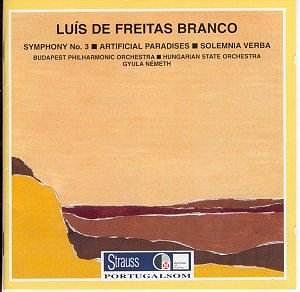 |
Luis de DE FREITAS BRANCO (1890-1955)
Symphony No. 3 (1944) [40.43] *
Artificial Paradises - symphonic poem (1910) [11.51]*
Solemnia Verba - symphonic poem (1951) [15.16] *
 Budapest PO/Gyula Nemeth Budapest PO/Gyula Nemeth
Hungarian State Orchestra/Gyula Nemeth
Rec Budapest, 26-30 April 1982 (symphony)
Rec Budapest, 18-25 April 1979
 PORTUGALSOM STRAUSS
SP 4165 [55.00?] PORTUGALSOM STRAUSS
SP 4165 [55.00?] |
Luis de Freitas Branco's first two symphonies were products of the
1920s - Francophile yet Brahmsian. Eighteen years were to elapse before
the Third appeared. It was written after his retirement from the Lisbon
Conservatoire. A self-confessed Monarchist his sympathies were no obstacle
to his conviction that music was for all the people; not just the ivory
towered elite.
The Symphony remains old-fashioned ... or largely so. The smoke
and menace of Bruckner's Eighth is there with swarthy brass melodramatics
and gawky attitude-striking themes. The gaunt woodwind writing of The
Rite of Spring crosses with Brucknerian patterns, accelerating woodwind
figures and belligerent brass motifs. A cool and unconfident nondescript
lento precedes an awkward angular allegro. There are some
signs that Honegger's music had reached Lisbon. The allegro vivace
could have done with a greater rush but this is still very effective
and even finds time to throw out hints of Piston and Tchaikovsky! A
not entirely satisfactory symphony but one with virtues worth hearing.
Artificial Paradises was inspired by Thomas de Quincey's
'Confessions of an Opium Eater'. It represents a high water mark in
the insurgence of impressionism in Portuguese music. The composer must
have been well read as one of his other inspirations was William Beckford
's 'Vathek'. He was much entangled in literary influences from Mallarmé
to Beckford, de Quincey to Guerra Junqueiro, Antero de Quental to Maeterlinck,
Julio Dinis to Camoes. This piece is a display of fragrantly sensuous
light-as-down music, prizing clarity and eschewing smudged textures.
It is agreeably insubstantial but rewards curiosity. Solemnia Verba
was sparked by a sonnet by Antero de Quental. Though written in
the 1950s the music harks back to Rimsky and especially the Russian
Easter Festival Overture with interruptions from Ravel (06.02) and,
in the last ten or so minutes, Tchaikovsky.
The notes are thorough and, apart from their total immersion in musical
technicality, are helpful. For those who find this enlightening there
are nineteen music exx. Once again proof-reading for the English section
is lacking. I offer to proof the English language sections of the next
issues without fee.
Unpretentious but always intriguing fare from Strauss.
Rob Barnett
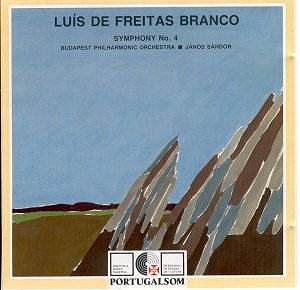 |
Luis de DE FREITAS BRANCO
(1890-1955)
Symphony No. 4 (1952) [35.47] *
 Budapest PO/Janos Sandor Budapest PO/Janos Sandor
Rec Hungaroton Studios, Budapest, 2-5 April 1987 DDD
 PORTUGALSOM STRAUSS
CD 870018/PS [35.47] PORTUGALSOM STRAUSS
CD 870018/PS [35.47] |
The Fourth and last of Freitas Branco's symphonies is the only
one of the Strauss series to be captured in DDD sound. The price (as
for everything from this splendidly adventurous catalogue) is modest
and the treasures are unfamiliar.
The annual Portugalsom trek, with performing materials, from Lisbon
to Budapest certainly paid off this time! Apart from the Braga Santos
Fourth (in any case with Rumanian forces!) nothing quite touches this
disc for sheer force and molten commitment.
The playing time is not generous. Uniform with the rest of the symphony
series, the notes are by Joao de Freitas Branco (1922-89). Eighteen
music exx and bilingual (Portuguese/English) programme notes. Proof-reading
would have been a good investment but this is a small quibble in the
face of such fiery music-making.
The work is strongly lyrical with woodwind accentuated. It has a folksy
feeling rather like Kodaly: unpretentiously melodic - generous of build,
prolonged in urgency. Sandor takes no prisoners, according the full
measure of lyricism but varying it with acrid violence straight out
of Shostakovich. The second movement is crowned with exalted and raucous
grandeur while the third rings the changes through chaos, a wheezy country
dance (think of the Alentejana suites) and a wild round dance. The 13.17
allegro yawns and stretches with moments of rusticity, starry
strings straight out of Daphnis, stomping symphonic momentum
(a hint of the symphonies by Kodaly and Moeran - twins separated at
birth!) and the return of the great yawing urgent melody from the first
movement. The symphony is dedicated to that other fine Portuguese symphonist,
Joly Braga Santos.
Rob Barnett
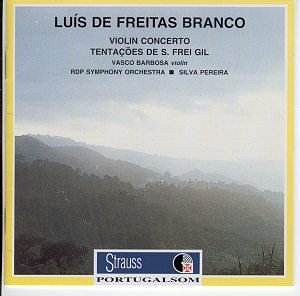 |
Luis de DE FREITAS BRANCO
(1890-1955)
Violin Concerto (1916) *
Tentacoes de S Frei Gil (1911) **
 Vasco Barbosa (violin)
* Vasco Barbosa (violin)
*
RDP SO/Silva Pereira
* rec Lisbon 17-20 June 1980 ADD
** rec Lisbon 9-10 December 1980 ADD
 PORTUGALSOM STRAUSS
SP4042 [49:58] PORTUGALSOM STRAUSS
SP4042 [49:58] |
De Freitas Branco’s dates place him squarely in the early twentieth
century romantic bracket. His music affirms this.
The Violin Concerto is another triumphantly super-romantic work
out of a similar mould to the Tchaikovskian concertos by de Boeck, Janis
Ivanovs and Karlowicz (all well worth getting to hear). De Freitas Branco
writes a good whistleable tune and can dig as deep into plush romanticism
as Korngold though his tunes are not quite as consummate. At the same
time they do not topple over into kitsch quite as easily as those of
Korngold. Barbosa (who can also be heard on another Portugalsom CD in
the violin sonatas) is dedicated and fiery - just listen to the way
he pitches into the start of the stormy third movement.
The Tentacoes de S. Frei Gil is in three segments: a
prelude and the Temptations of Death and of Life. The three movements
are extracted from an oratorio of the same name. The music tries to
shake off somnolent Slav reverence but this mood is in the ascendant
and the Temptation of Death clearly carries the field. This is
by no means as satisfactory a work as the same composer's Vathek
(on SP 4130).
Silva Pereira and the RDP SO are firing on all cylinders exactly
as with Pereira's intoxicating version of the Braga Santos Fourth Symphony.
Rob Barnett
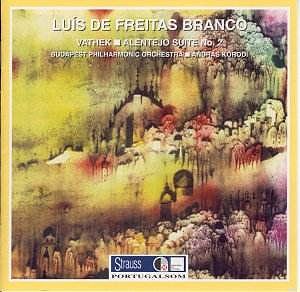 |
Luis de DE FREITAS BRANCO
(1890-1955)
Vathek (1913) [27.07]
Suite Alentejana no. 2 (1927) [17.22]
 Budapest PO/Andras
Korodi Budapest PO/Andras
Korodi
* rec Budapest 2-10 May 1985 AAD
 PORTUGALSOM STRAUSS
SP 4130 [43:07] PORTUGALSOM STRAUSS
SP 4130 [43:07] |
It was not so very long ago (OK, the 1980s!) that the German company,
Capriccio, issued three discs selecting rare orchestral pieces inspired
by the exotic Orient. Luis de Freitas Branco's Vathek could easily
have been stabled there.
Vathek is an eighteenth century novella by the Englishman, William
Beckford. Beckford had links with Portugal and spent some years there.
The book is a spiced and densely descriptive pre-Gothic fantasy on the
Calif, Vathek, whose limitless wealth was deployed in saturated pleasure. He
created and stocked five palaces each dedicated to sensuality: food,
music, art, fragrance and eros.
Broadly speaking this magically orchestrated music is in the same territory
as Schmitt's Salome, Dukas's La Péri, Rimsky's
Sheherazade and Griffes' Pleasure Dome. Raw brass fanfares,
violent dances, Pierrot twilights, voluptuous Franckian climaxes (cf
Psyche), drizzling doom and birdsong (uncannily similar to Holbrooke's
Birds of Rhiannon music - a legend now appropriated by MacMillan),
Vathek was in sympathy with Flecker's pilgrims who took the Golden Road
to Samarkand for 'lust of knowing what should not be known.' There is
a wholly fitting sense of exhaustion in the epilogue. The work is in
eight separately tracked segments played contiguously.
There are two Alentejo suites. The first, from 1917,
is on SP 4073. The music captures mist-filled ravines, Ravelian lightness,
a technicolour approach married with the fragile impressionism of Mère
l'Oie. Massenet (Le Cid - remember Frémaux's cracking
and still unbeaten Columbia/EMI Studio 4 recording of the dances
with the CBSO?), Chabrier, Borodin (Igor), Beethoven (Pastoral)
and Sibelius (Karelia) all put in an appearance.
Rob Barnett
ORDERING
For UK --- £6 each
Freight --- up to 3 CDs --- not registered --- £2.40;registered----
£3.50
For USA --$ 10 each
Freight --up to 3CDs -- not registered ---$5 ;registered ---- $6.80
We accept Visa or American Express
Orders : to the attention of Eduarda Martins
by fax to the nº 351217141723
By mail to :
Rua Adelaide Cabete,3C
1500-023 LISBOA
Portugal
by e-mail to: info@strauss.pt
|
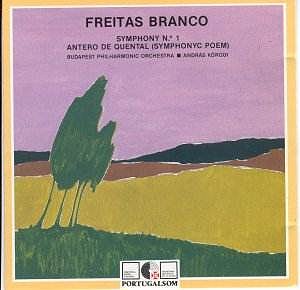
![]() Budapest PO/Andras Korodi
Budapest PO/Andras Korodi![]() PORTUGALSOM STRAUSS
CD 870004/PS [43.57]
PORTUGALSOM STRAUSS
CD 870004/PS [43.57]
